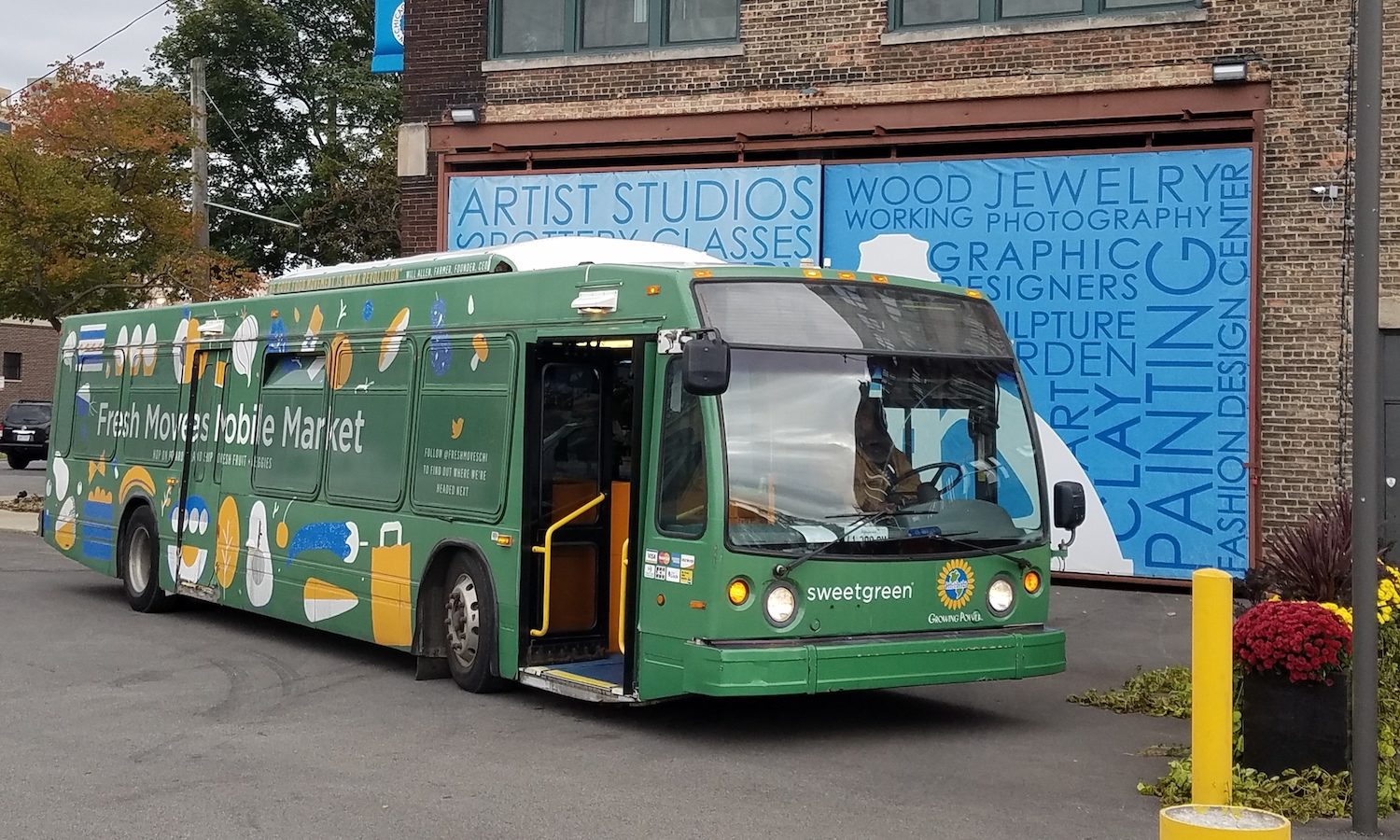Mobile Markets Improve Fresh Produce Access in Chicago Neighborhoods

Fresh Moves Mobile Market/Urban Growers Collective
Each week, Chicago’s Fresh Moves Mobile Market delivers fresh produce to more than a dozen schools and community and health centers using renovated city buses. These mobile markets transport fresh food to places where people already are—including the Komed Holman Health Center, the Academy for Global Citizenship, and the Carter G. Woodson Regional Library.
Fresh Moves Mobile Market is one of several Urban Growers Collective programs that UGC founders, Laurell Sims and Erika Allen, have undertaken since fall 2017. Fresh Moves Mobile Market evolved from the nonprofit Growing Power Chicago (GPC). Modeled after Growing Power Milwaukee, it was inherited by UGC.
“About five years ago the city of Chicago asked us to take over the program when the nonprofit folded,” Sims tells Food Tank. “We changed to growing food with a focus on how to heal folks.” Sims is Chief Executive Officer, Finance.
Fresh Moves Mobile Market is a natural outgrowth of UGC “because we grow food in the community and we want people with limited access to have the ability to consume culturally appropriate, healthy vegetables,” says Allen, Chief Executive Officer, Operations. Wholesale fruit is also available in the mobile market.
For people living in the south and west sides of Chicago, access to fresh food has typically been difficult. That has made it so much easier to buy cheap food that may negatively impact health and energy levels.
Allen says choosing appropriate drop-off sites for Fresh Moves Mobile Market, plus working with organizations that are interested in alleviating food access issues and are good partners, both enhance the program’s success.
“A lot of the places we go emphasize eating healthy food and educating people about the need to do that,” says Sims. “We get around 150-200 people per week on average. Most folks buy 4.5 to 9 kilograms (10-20 pounds) of food, but…it depends on what they purchase. A lot of what we sell is by the piece because it is easier to sell to folks than by weight.”
The Chicago Housing Authority provided some underutilized land. UGC then worked with the Parks Department to find a third site. On these farming sites Fresh Moves Mobile Market also offers programming and job training. Youth and adult trainees help with weeding.
“Our organization farms the land,” Sims tells Food Tank. “We want to create the healthiest produce that we can—highly nutritious and chemically free.”
Market produce comes from eight urban farms emphasizing organic growing methods. They’re spread across 44515.4 square meters (11 acres) of land—predominantly on the city’s south side.
This produce plus some wholesale produce goes onto the bus, especially in wintertime. “We can grow a lot of greens during the winter, in unheated hoop houses,” Sims says. “Having access to healthy food helps communities with job training, and with beautification of land in neighborhoods too.”
Fresh Moves Mobile Market also aims to offer culturally appropriate foods for each neighborhood such as collard greens which may especially appeal to African American consumers. But the produce typically sells at half the price found in a traditional grocery store. Participating farmers are paid the same amount as what they receive at other markets.
When Sims and Allen took over, they found the original GPC buses too old. They initially retro-fitted a library bus and then did a lot of renovations on two CTA buses, with volunteer help. There are currently three buses with one active at a time. Two to three deliveries typically take place on Mondays through Saturdays.
Fresh Moves Mobile Market has become very popular among recipients and especially senior citizens who live in health facilities. However, anyone can buy items from the bus – wherever it parks.
Program sponsors play an important role, from individual to corporate. CTA has been a big help with vehicle maintenance. Barilla, which has its headquarters in the United States in Chicago, has become another important sponsor. “We pitched the bus idea to them, about three years ago,” says Sims. “They give us money for the program and they also give us pasta which we use as an incentive [for customers] to buy other items.”
“We inherited the program,” Allen tells Food Tank. “But it’s very site-specific to the city, the organization, and its capacity.” As Fresh Moves Mobile Market moves forward, it aims to integrate nutrition counseling into more stops. Fundraising for a new, more reliable vehicle is also on the horizon.
But the overarching goal remains the same. “We can take food grown in the neighborhood, put it on the bus and share it with neighborhoods,” says Sims.
You can find this Food Tank Article here.